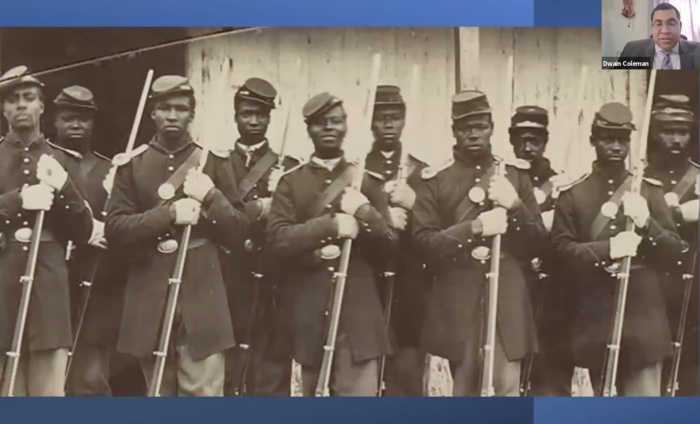This column by Daniel G. Clark about Alexander Clark (1826-1891) first appeared in the Muscatine Journal.
In July 1863 the War Department authorized Col. William A. Pile “to raise a regiment of men of African descent” to be known as the “First Regiment of Iowa African Infantry.” Keokuk was their rendezvous, and Alexander Clark of Muscatine was a main recruiter. While serving in Arkansas, the regiment was reorganized as the 60th U.S. Colored Troops (USCT).
After the war it was said the regiment had included “about every man of African descent in the state who was capable of performing military service.” (Davenport Gazette, April 17, 1867)
An official 1911 report repeated the claim and said there was “an ardent desire” by “Iowa men of negro blood” to fight against slavery.
“Six companies for the regiment were recruited in Iowa, and comprised within their ranks almost every man of African descent in the State who was capable of performing military service. Four companies were recruited in Missouri, but in all the companies appear names of men from adjoining States, as shown by the original roster of the regiment.” (Roster & record of Iowa soldiers in the War of the Rebellion, published by authority of the General Assembly, Adjutant General’s office, Volume V, 1911.)
“The opportunity to enroll themselves among the Nation’s defenders was long delayed, but, when it came, they were found ready and eager to take part in the struggle which ended in the emancipation of four millions of their race from the degradation of human slavery.”
Historian David J. Brodnax Sr. has researched and written much of what is known about Iowa’s regiment. He wrote: “Despite many reports to the contrary, it appears that nearly all of the 1st African’s enlisted men were recent arrivals from Missouri and that most prewar black Iowans did not enlist.” (Breathing the Freedom’s Air: The African American Struggle for Equal Citizenship in Iowa, 1830-1900, 2007.)
Brodnax said the misconception might have started with “some creative accounting by Governor [Samuel] Kirkwood, who claimed 903 black soldiers; the state quartermaster general eventually admitted that ‘many of the men enlisted in this regiment came from Missouri,’ though, and Iowa was credited with 440 black troops.”
I sorted the 1911 list by nativity and found as follows: Missouri 476, unknown nativity 181, Kentucky 142, Virginia 126, Tennessee 57, Illinois 24, Iowa 14. The rest were reported born in 21 other states, plus two foreign-born officers (Germany and Ireland) and one man who claimed Africa.
I made another pass through the lists, this time noting town or county of residence. By my count, 399 considered themselves Iowans at time of enlistment. Of these, 77 claimed Keokuk, where the regiment was organized.
Historian Paul Finkelman has described the enlistment of men escaping slavery as a large-scale expansion of Underground Railroad freedom seeking. Keokuk was free soil near the slave-holding border state Missouri. Joining the army was a way to demonstrate manhood and stake a claim for rights as citizens.
Brodnax: “Although almost no fighting took place in Iowa, its race relations were fundamentally transformed by the war. When it was over, thousands of African Americans had migrated into the state, and hundreds of them had declared their right to equal citizenship through military service. … It would take a civil war…and one thousand armed black men, to finally bring about real change.”
Many of the thousand—more or less—did not survive the war. Of the total enrollment of 1,153 in the 60th USCT, 12 were killed (11 enlisted, one white officer) and 332 died of disease.
Seven hundred reportedly took part in the Oct. 31 convention Clark organized at Camp McClellan, Davenport, when they mustered out.
Davenport Daily Gazette editorial (November 4, 1865): “Each one of these seven hundred colored soldiers represented in the field a white citizen, who but for the proxy of that negro soldier would have been compelled to enter the ranks and incur the risk of battle. … Can any one anywhere tell us why the ballot should not be placed in the hands of these Iowa soldiers who have so faithfully used the bullet in the Nation’s defense?”
On Abraham Lincoln’s birthday 1868, Clark addressed a voting-rights convention in Des Moines and authored the gathering’s official address “to the People of Iowa.” Published as a pamphlet and printed in papers around the state, it demanded the franchise “in the honored name of 200,000 colored troops, five hundred of whom were from our own Iowa.”
Around 220 settled in Iowa, throughout the state, according to historian Dwain Coleman’s 2021 webinar about the regiment, “‘We Came Home Together’: Black Civil War Veterans and Community Building in Iowa.”
Brodnax: “Ultimately, though, the lack of open farmland and large cities discouraged migration to Iowa on the same scale as in the northeast or even some other Midwestern states, and although the black population grew in size dramatically, it remained a small percentage of the population.”
Next time: As if an earthquake
Top image: USCT soldiers in screenshot from Dwain Coleman’s webinar presentation (State Historical Society of Iowa, November 4, 2021).


1 Comment
Excellent article
Thank you- excellent article and well researched.
HHHdemocrat Wed 8 Feb 9:15 AM